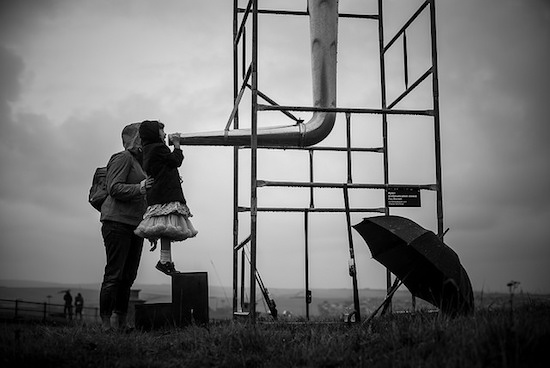Photos by Agata Urbaniak
The environment is part of the performance
Up on Newhaven Fort’s ramparts, Mark Anderson’s ‘Phantom Field’ is an installation of 21 skeletal ‘wind synthesizers’ played by the buffeting breezes, while the rain ricochets off the spinning silver half-shells of Mike Blow’s ‘Arpeggi’ piece nearby. Cold rain is never ideal festival weather, but here it’s incorporated into the experience: the crowd waiting for a delayed Rhys Chatham listen together as the downpour blows across the Romney Hut’s corrugated metal roof, spontaneously murmuring in appreciation.
Sometimes you have to go with the flow
Fort Process encourages free-flowing exploration and there’s little point in planning your day overmuch. Intending to watch raging jazz terrorists Shatner’s Bassoon in the Romney Hut, I found myself captivated by David Thomas Broughton in the Grand Magazine instead. Possessed of a unique singing voice, like an avant-garde Jake Thackray, Broughton fragments his performance by channelling voice and finger-picked acoustic guitar through loop pedals and distant speakers, compulsively removing and replacing clothes, obsessing over stance and emphasising awkwardness, all the while providing his own muttered commentary on the gap between expectations and reality.
Sometimes you need to stay put
Although it’s tempting to keep on moving, catching a bit of everything, occasionally the work demands you engage with it more deeply. Sinking into Ore’s dark tone bath of ‘doom tuba’ with minimal slide trombone accompaniment, the military associations of brass instruments in this setting quietly inform the non-martial but distinctly mournful soundscapes.
With great responsibility comes great power
For their performance/installation piece ‘Feedback’, The Larsens asked women to submit recordings of them talking about their bodies. The female seven-piece respond to the resulting audio collage with vocalisation, plainsong, movement and cathartic screams, exorcising a collective testimony of socially induced anxiety and self-criticism, leavened with hard-won acceptance and self-love. Black-wigged and sat in a circle, The Larsens play up to witchy stereotypes then conjure powerful spells in the dark, carefully lit space, brilliantly combining voice-based experimental music with actual documentary voices from within their community.
There’s more to Ryvita than you think
Similar themes surface in the Ryvita-based performance by The Mysterious Monopole, aka artist-musician Emily Kawasaki. As Kawasaki saws into stacks of the polystyrene-like crispbread or plays it on a vintage gramophone, the popular rye-based product proves a resilient and satisfactorily noisy instrument, as well as a powerful symbol of socially enforced dieting pressures and linked expectations of gender roles and performance. Non-binary-identifying women are invited to shout "Tell me boys, is it noise?" into a microphone as Kawasaki bites into then discards hunks of the dusty food substitute, climaxing a funny, liberating and visceral set.
If you feel like dancing, you probably should
While not all music has to be dance music, serious experimental work certainly isn’t trivialised by booty-shaking. Ana Gutieszca’s blistering set of stern electronic noise, perfectly complemented by the brain-melting, red and monochrome patterns flashing on the screen behind, should explode into a punishing goth rave, but sadly our inhibitions keep us stationary. Controversial dance moves break out to Map 71’s strict fusillade of live drums, electronic patterns and spat-out spoken word, while the phenomenal Aja incites minor mayhem with pounding bass noise and frequent forays into a keyed-up crowd. By the time we arrive at Bunty’s beguiling homemade hip-hop, beats created on the spot from sampled vocal tics and found percussion, we’re all shaking out the cold and damp, an active part of the Fort Process experience.


